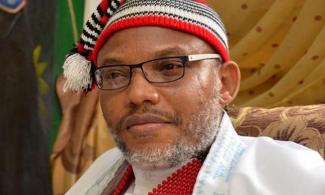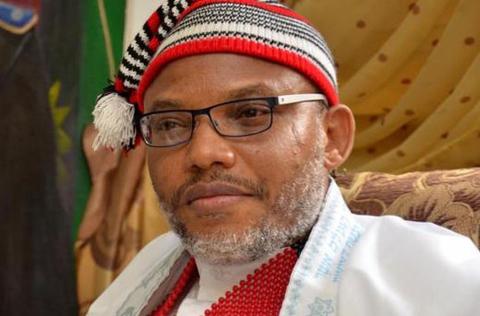
They also accused Truss of failing to end Kanu’s “unlawful” detention in Nigeria.
The family of the leader of the Indigenous People of Biafra (IPOB), Nnamdi Kanu, have accused the UK Secretary of State for Foreign, Commonwealth and Development Affairs, Liz Truss of ignoring evidence that the IPOB leader was taken to Nigeria from Kenya in an act of extraordinary rendition.
They also accused Truss of failing to end Kanu’s “unlawful” detention in Nigeria.

Kanu, the leader of the proscribed separatist group, has been detained since his rendition to Nigeria in June 2021. The IPOB leader is a British citizen and his supporters and family have been disappointed that the UK does not appear to be working to get him freed.
The Nigerian government has previously claimed Kanu was extradited to Abuja, Nigeria’s capital with assistance from Interpol but his family say the IPOB leader was seized and tortured in Kenya before being flown to Nigeria.
The Guardian UK reports that in a pre-action legal letter to the foreign secretary, Liz Truss, the family’s lawyers, Bindmans LLP, say there is “overwhelming evidence” that he was subjected to extraordinary rendition.
The letter cites testimony Kanu has given to his lawyers and brother, an expert report, which has identified the flight they believe he was unlawfully transported on, and the Nigerian government’s failure to provide details as to how Kanu – who did not have his British passport with him – came to be there.
Bindmans, which has previously threatened legal action over lack of consular assistance for Kanu, says Truss must take a view on whether there has been a breach of international law or face a court challenge.
“If Mr Kanu has been subject to extraordinary rendition, this is a grave breach of international law which has a significant impact on the discretion which the secretary of state exercises in respect of the steps she should take to assist Mr Kanu under international and domestic law,” wrote Bindmans solicitor Shirin Marker.
“Forming a view as to whether a breach of international law has occurred, and if so the gravity of the breach, is therefore an essential prerequisite to the exercise of discretion on taking further steps at international and domestic law.”
According to the letter, Kanu was tortured and subjected to inhuman treatment in Kenya last year. He was allegedly detained by security agents in Kenya, who took him to a house where he was chained to the floor and beaten for approximately eight days. He was subsequently put on a private jet on June 27 and flown to Abuja, the letter also says.
Kanu’s brother, Kingsley, said: “With every day that passes, I am increasingly concerned for my brother’s welfare in detention and increasingly frustrated by the UK government’s ineffectiveness in assisting him. I hope the court will rule the foreign secretary must recognise the seriousness of my brother’s situation and properly consider what other steps she can take to assist him in light of his extraordinary rendition.”
Kanu was arrested in Nigeria in 2015 and charged with terrorism-related offences. But in 2017 after securing bail, the military invaded his home in Abia State, allegedly killing many IPOB members. Kanu subsequently fled Nigeria.
However, his case has since resumed at a Federal High Court in Abuja following his rendition and detention by Nigeria’s secret police, the Department of State Services (DSS).